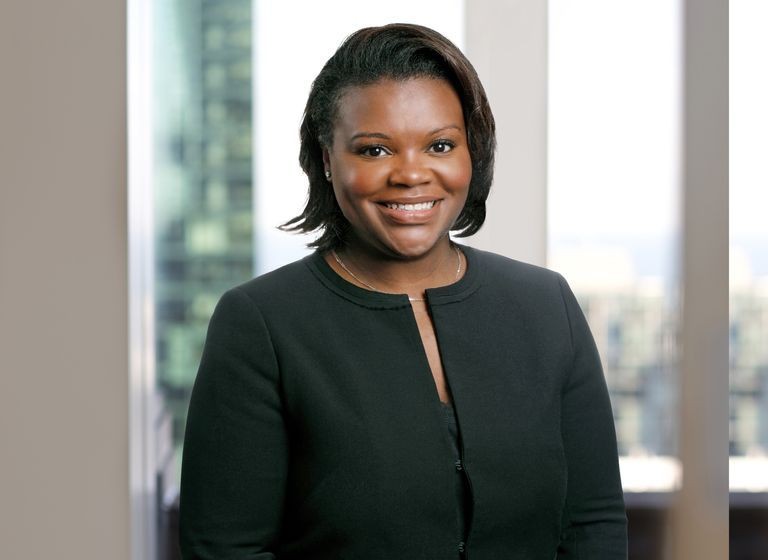Shauneida C. Navarrete
Overview
Shauneida Navarrete’s practice focuses on employment and general commercial litigation disputes in state and federal courts, as well as domestic arbitration forums. In all matters, she partners with clients to help ensure a reasonable resolution for their disputes— whether the resolutions require general advice, mediation, or litigation.
Career & Education
- Fordham University School of Law, J.D., 2009
- Barnard College, B.A., 2004
- New York
- U.S. District Court for the Southern District of New York
- U.S. District Court for the Eastern District of New York
- Member, American Bar Association Labor and Employment Law Section
- Member, American Bar Association Litigation Section
Shauneida's Insights
Webinar | 07.30.25
H2 2025: What Retailers/E-Commerce Need to Know
Join us to learn about several significant legal changes in the first half of 2025 that impact retailers/e-commerce in the United States.
Speaking Engagement | 07.30.25
"H2 2025: What Retailers/E-Commerce Need to Know," Crowell & Moring Webinar
Blog Post | 07.23.25
Register Now! H2 2025: What Retailers/E-Commerce Need to Know Webinar
Client Alert | 3 min read | 07.18.25
Representative Matters
- Defending a multinational mining and energy corporation in a billion dollar U.S. federal civil RICO action.
- Representing thousands of individuals in a class action employment discrimination litigation.
- Defending international law firm in defense against former clients and attorneys concerning malpractice, breach of contract, and indemnification claims.
- Counseling and defending financial institution in defense of discrimination investigation conducted by New York City Commission on Human Rights.
- Defending Board of Elections in voting rights claims brought by individual constituents.
- Counseling a majority stockholder in tender offer litigation concerning the purchase of a Fortune 1000 company.
- Counseling and defending a Fortune 1000 client in a New York Attorney General investigation involving allegations of false advertising and deceptive marketing.
- Counseling non-party software company specializing in providing media data to advertising agencies in subpoena response in contentious multi-district litigation.
- Counseling a non-profit organization against former landlord’s holdover and breach of contract claim.
- Counseling and defending an attorney draftsman in deposition regarding construction of two multimillion-dollar trusts and corresponding wills.
- Representing an AmLaw100 law firm in arbitration against former investment management client seeking over U.S. $1 million in unpaid legal fees.
- Representing an AmLaw100 law firm in enforcing a court judgment and collection of over U.S. $1 million judgment from investment management client.
- Counseling a private technology company regarding due diligence requirements in merger with private equity firm.
- Counseling numerous victims of domestic violence in divorces from their abusers.
Shauneida's Insights
Webinar | 07.30.25
H2 2025: What Retailers/E-Commerce Need to Know
Join us to learn about several significant legal changes in the first half of 2025 that impact retailers/e-commerce in the United States.
Speaking Engagement | 07.30.25
"H2 2025: What Retailers/E-Commerce Need to Know," Crowell & Moring Webinar
Blog Post | 07.23.25
Register Now! H2 2025: What Retailers/E-Commerce Need to Know Webinar
Client Alert | 3 min read | 07.18.25
Insights
New York City AI Bias Law Charts New Territory for Employers
|08.29.22
Bloomberg Law's Daily Labor Report ®
- |
2015
Commercial Litigation in New York State Courts, Thomson Reuters, 4th edition
- |
2011-2015
Practising Law Institute’s Answer Book: Insider Trading Law and Compliance, Practising Law Institute
Register Now! H2 2025: What Retailers/E-Commerce Need to Know Webinar
|07.23.25
Crowell & Moring’s Retail & Consumer Products Law Observer
Eighth Circuit Cancels Click-to-Cancel
|07.18.25
Crowell & Moring’s Retail & Consumer Products Law Observer
Shauneida's Insights
Webinar | 07.30.25
H2 2025: What Retailers/E-Commerce Need to Know
Join us to learn about several significant legal changes in the first half of 2025 that impact retailers/e-commerce in the United States.
Speaking Engagement | 07.30.25
"H2 2025: What Retailers/E-Commerce Need to Know," Crowell & Moring Webinar
Blog Post | 07.23.25
Register Now! H2 2025: What Retailers/E-Commerce Need to Know Webinar
Client Alert | 3 min read | 07.18.25






